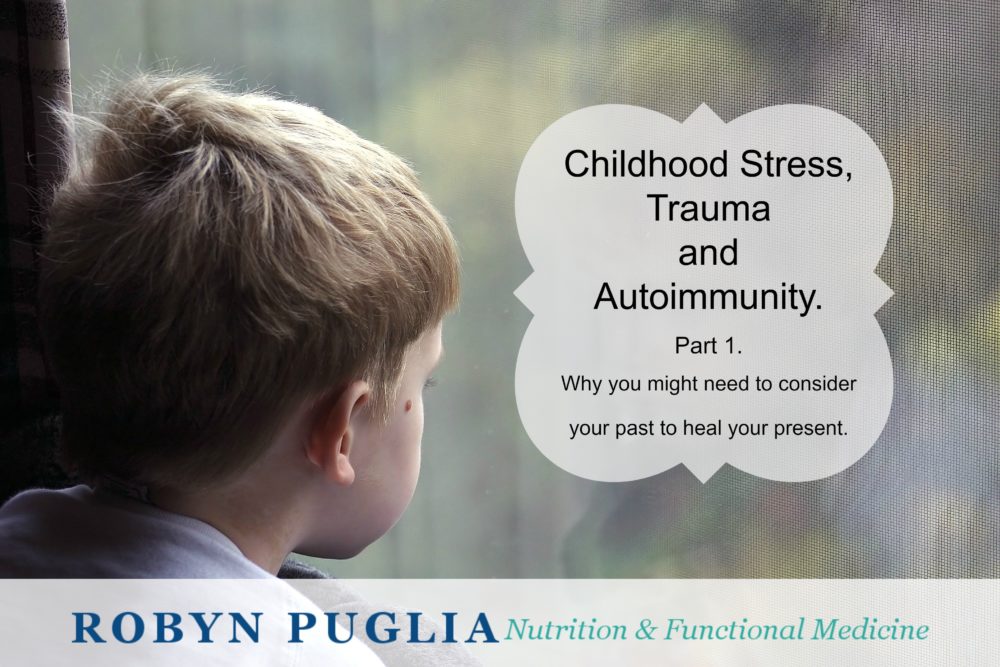Part one of two in a series examining autoimmunity and trauma.
If you have a long-term autoimmune disease, it’s easy to make your diet, energy levels, and physical well-being your main focus. However, there can be a mental health aspect to your disease which may not be immediately apparent – but it can affect you everyday.
While it’s true that my patients with autoimmune disease do struggle with stress and anxiety, it’s often caused by unrealistic expectations of themselves, conflict at home or at work. Or could it be the strain of being ill, but trying to carry on like normal?
Sometimes I meet a patient who is carrying a lot of anger and fear alongside the burden of their autoimmunity. Just one of these aspects is tough enough to deal with, but the combination of autoimmune disease and emotional trauma is very hard to bear. Stress can make your autoimmune disease worse, but hidden trauma – particularly trauma experience in childhood– is actually a precedent for autoimmune disease.
The good news is that both your autoimmune disease and the trauma can be treated, even if you haven’t thought about your childhood in years.
The Stress and Autoimmune Disease Connection
Stress has a serious impact on your brain. Chronic daily stress observed on an MRI scan of the brain human brain looks the same as the effects of PTSD. Your brain changes when you are dealing with trauma, stress, or depression, causing hypothalamic pituitary adrenal (HPA) axis dysfunction.
In terms of childhood trauma – as a child you were simply trying to get through each day. You may have had to bottle up your feelings, but you may also have absorbed the negative emotions and reactions of the adults around you. These fears, rages, and sadness can enlarge the amygdala over time. Your amygdala is a dense section of grey matter in the right hemisphere of your brain, which is responsible for triggering your stress response, triggering your hypothalamus.
Your hypothalamus links up your nervous system and your endocrine system via the pituitary gland. The size of an almond, the hypothalamus is also responsible for forming attachment behaviours. In turn, the pituitary gland, positioned beneath the hypothalamus, secretes adrenocorticotropic hormone (ACTH) to stimulate hormone production in the adrenal glands.
The adrenal glands release into your body:
- Cortisol – known as the stress hormone, normally cortisol helps the body process food and regulate blood sugar, but it is also a known suppressor of your immune system.
- Adrenaline – the hormone responsible for the fight or flight instinct. But, in times of stress or trauma, the continued triggering of adrenaline can deplete energy levels and create added strain.
- Noradrenaline – works alongside adrenaline and focuses your attention by releasing glucose into your blood.
If you experienced high levels of stress as a child, it may have caused depression, anxiety, low-self esteem, anger issues – or, ultimately, your autoimmune disease. But the good news is that your brain is incredibly adaptable, and by working on yourself emotionally, you have the potential to change the density of the grey matter of your amygdala.
That’s the amazing thing about the human body – and the truth I come back to again and again as a functional medicine practitioner: nothing is set in stone. You can make changes in your lifestyle, diet, and mental health which allow your body and brain to adapt and improve.
The Autoimmune Response to Stress
When cortisol gets kicked into high gear over a long period of time, it has all sorts of negative effects.
- High levels of cortisol in your bloodstream can dampen the effects of your immune system.
- It also affects your digestive system and the function of your gut lining.
- Cortisol can also increase the number of cytokines in your bloodstream, potentially increasing inflammation in the body.
- Cortisol even shrinks your prefrontal cortex, which is responsible for your decision making in the present and the future. Meaning, extreme stress can affect the way you process decisions!
- Cortisol also affects your hippocampus, which is responsible for your short term memory.
Many trauma survivors experience gaps in their memory, as this change in the brain prevents the forming of new memories. So, there are often gaps in your childhood memories if you have had an experience of abuse. Unfortunately, this affect to your hippocampus results in even more cortisol being produced and released by your body – a self–fulfilling cycle.
High levels of cortisol in your bloodstream can be either a precedent to autoimmune disease or a full blown trigger. Read my article on autoimmune triggers to learn about the difference between triggers and precedents.
In a study of sleep-deprived firefighters, high levels of cortisol induced increased levels of cytokines, an autoimmune signaller responsible for inciting inflammation. Elevated cytokines have been found in adults who experienced trauma as children. Many Iraq veterans with PTSD face autoimmune disease as a result of the great stress they were under during their service.
High levels of cortisol can increase your chances of getting the following autoimmune diseases:
- Cardiovascular disease
- Rheumatoid arthritis
- Lupus
- Irritable Bowel Syndrome (IBS)
- Chronic Fatigue Syndrome (CFS)
…and many more. There are over 140 diseases that are categorised as autoimmune, and that number is set to rise!
How Past Trauma Affects My Autoimmunity Today?
If you experienced great trauma or periods of stress, you may have had high levels of cortisol as a child, or it may now be rising as you begin to process the events of your childhood. Thoughts and feelings you may have placed in a box many years ago may be manifesting as your autoimmune disease.
Your current stress can also reactivate old infections – causing your immune system to fight the infection, provoking inflammation and triggering a further stress response from your immune system. Cortisol and autoimmune disease are intrinsically linked.
Obviously, not everyone who develops an autoimmune disease has suffered trauma. But the experience of child abuse has the potential to make a large impact on your autoimmune system, because as a child, you did not have a fully developed prefrontal cortex.
Your prefrontal cortex is responsible for:
- Expressing personality
- Decision making
- Complex cognitive tasks
- Social behaviour
When an adverse event happens, a child can struggle to understand it. In the case of trauma or abuse this can hinder the child’s development and belief process. Ultimately, whatever beliefs you form in childhood can be carried forward into adulthood and believed to the same intensity.
These beliefs, along with the changes to your prefrontal cortex have an effect on your adult relationships, the way you relate to society, and the way you handle stress throughout your life. Your ability to handle stress has been hamstrung from a very early age, potentially making your autoimmune symptoms worse in the process.
How Do I Tell If I Have Autoimmune Trauma?
Autoimmune diseases are predominately a women’s health problem: unfortunately, the experience of physical and sexual abuse is all too common for women also. If you feel you are in an unsafe situation, whether or not it is worsening your autoimmune disease, then you need to find help. Get in touch with the National Domestic Violence Helpline, the 24-hour freephone is 0808 2000 247. There are also resources for men in unsafe situations.
In a major US study, adverse childhood experiences (ACEs) were broken down into the following subsections:
- Abuse
-
- Physical
- Emotional
- Sexual
- Neglect
-
- Physical
- Emotional
- Rejection
-
- Sexuality
- Community
- Family
- Religion
- Self
- Household dysfunction
-
- Mental illness
- Witness to domestic violence
- Divorce
- Incarcerated family member
- Substance abuse
- Death or loss
Ultimately, it can only take one ACE to affect your mental and physical well-being. Patients who scored 1 or more ACEs often displayed the following behaviour:
- Lack of physical activity
- Smoking
- Alcoholism or heavy drinking
- Drug use
- Missed work
- Dropping out of education
- Sexual promiscuity
Adults who have experienced one or more ACEs may struggle with one or more of the following:
- Obesity
- Autoimmune disease
- Depression
- Suicide attempt
- STDs
- Altered gene expression
- Heart disease
- Cancer
- Stroke
- COPD
- Broken bones
- Unhealthy relationships
Unfortunately the more ACEs you’ve experienced, there’s a higher likelihood you may contract an autoimmune disease. Also, a risk for hospitalisation of autoimmune disease is 70 to 80% higher for a patient with an ACE score of 2 or more.
Individuals who have struggled with adverse childhood experiences can find it difficult to undergo self care, particularly in the case of women. If you are used to adopting a caretaker role, you may put your own emotions and comfort last. We are often guilty of comparing our pain to that of others and feeling like our problems fall short. But your pain is real, and you may now have the key to improving your autoimmunity.
How Do I Work Out If Trauma Is a Factor in My Autoimmune Disease?
The simplest way to find out if your autoimmune disease may have a basis in early trauma is to take the ACE test.
When I work through my patients’ health timeline, I ask many questions – not all of them directly involved with past health care and treatments. I believe this is the best way to look at my patients’ health as a whole. I recommend writing out a mental health timeline as a crucial step to understanding your past, and cementing the decision to work on your mental health. As everything is connected, improving your mind may well improve your body and soul.
For this exercise, make sure you are in a safe space: mentally and physically.
- Set a timer for twenty minutes.
- Take a sheet of A4 paper and turn it landscape.
- Draw a line horizontally across the middle.
- On the left side next to the beginning of the line write 0, and on the other end of the line write your current age. This is your personal timeline.
- Write down all your physical issues and the age at which it first manifested, and mark on the timeline when it happened.
- Also consider early childhood experiences, your life as a teenager, and as an young adult. Think about your inner life, your mental life, and your emotional life. This may be quite a painful process as you reflect on uncomfortable emotions and memories – so this is why want you to only do it for 20 minutes at a time.
- When your alarm goes off, put your pen down. You may have to work on this exercise again over a few days until it is finished, but always make sure you have something to look forward to afterwards: for example, a phone call with a friend, a nice warm bath, pet cuddles, or a square of dark chocolate.
Unresolved trauma may result in a repetition of a belief which manifested when you were a child. While this belief may have helped you through hard times back then, it is now outdated and may cause you harm to continue to reinforce it every day. In fact, it may be making you more ill.
From a functional medicine perspective, it is worth while exploring whether you had any adverse childhood experiences. ACEs can act as a predisposition to autoimmune issues but I assure you this is fixable! Along with any gut issues and dietary issues, we can work together to help you move forward and improve your life as well as your physical and mental well-being.
Part two in this series concentrates on proven methods you can use to reduce the impact of stress on your brain. The article also delves into your thoughts and beliefs which could be holding you back, and CBT practices you can use to aid you in your journey to recovery.
If you’re affected by any of the issues described in this article please contact the Samaritans, call 111 for out-of-hours NHS advice, or see your GP for further guidance. HAVOCA and NAPAC are also useful organisations for survivors of abuse.
The relationship between both current and childhood stress and chronic illness/autoimmune disease is so great, and so obvious in my clinical practice, that I have included working on this area as one of the 4 modules of The Foundations of Health. You can be taking the best supplements and eating ‘perfectly’, but if you are not addressing this area then it can actually be a deal-breaker. It’s not easy, but it is so important. See more about the work I do in The Foundations of Health here.
If you would like to get in touch to organise nutrient deficiency testing or discuss how to address your on-going issues, please drop me a line here.
And if you’d like to stay up to date with my new blogs, recipes and recommendations: Sign up for my newsletter!






